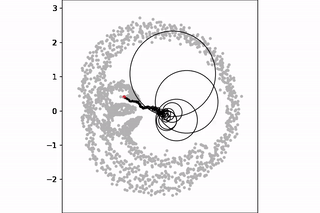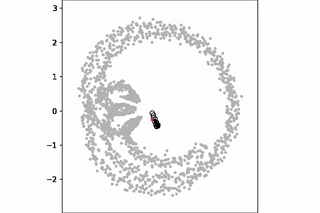The late deadline assignment for Project S CS 189 at Berkeley
Kaahan Radia Stephen Lin Eric Li Parker Nelson
Three of the four necessary datasets are included (moon_phase_data.csv moon phase models; solar_eclipse_data.csv; eclipfinal_motion_data.csv for planetary motion). Unfortunately our fourier features dataset is too large for GitHub (we're looking into alternate hosting solutions), so please generate the fourier features using the command below.
If you would like to generate the datasets from scratch you can follow the following instructions.
From the root directory, run:
python planetary_motion/generate_raw_data.py final_data.csv --start 1850-01-01-00-00-00 --end 2000-01-01-00-00-00 --freq 5D
and
python planetary_motion/generate_raw_data.py motion_data.csv --start 1995-01-01-00-00-00 --end 2000-01-01-00-00-00 --freq 1D
as well as the fourier features generation (you may have to create the folder fourier_features:
python planetary_motion/fourier_data.py ./raw_features/motion_data.csv ./fourier_features/fourier_motion.
Finally, execute the notebooks eclipse/predict_eclipse.ipynb and moon_phase/predict_moon_phase.ipynb with local variable GENERATE_DATA=True. See the notebooks for more details.
We've included trained models (for Ridge, DFT, and OLS) trained on aforementioned datasets.
You can run inference for some time t (format %Y-%m-%d %H:%M:%S) by executing the following command (arbitrary date and model chosen):
python planetary_motion/planetary_motion.py "2000-01-05 00:00:00" ./raw_features/final_motion_data.csv ./fourier_features/fourier_motion.npy ridge --load_models True
ridge can be replaced by ols or dft to use the respective models.
To train the models from scratch, simply exclude the --load_models True option i.e.
python planetary_motion/planetary_motion.py "2000-01-05 00:00:00" ./raw_features/final_motion_data.csv ./fourier_features/fourier_motion.npy ridge
We have included a command-line script for eclipse models. First, navigate to the eclipse directory. Then execute the predict_eclipse.py script:
python predict_eclipse.py DATE TIME, where DATE is in the format YYYY-MM-DD and time is in the format HH:MM:SS.
Example: python predict_eclipse.py 2144-05-03 01:02:06
To use the moon phase models, simply execute the notebook moon_phase/predict_moon_phase.ipynb.
Numpy SciPy Pandas sklearn tqdm AstroPy Astroplan jdcal fbprophet

